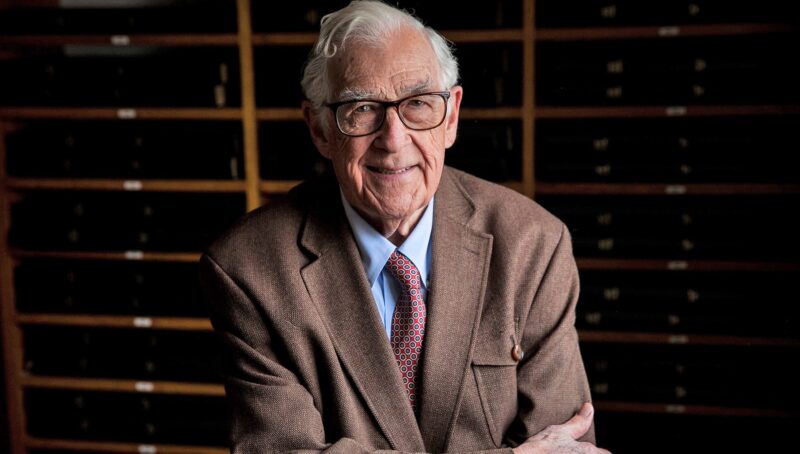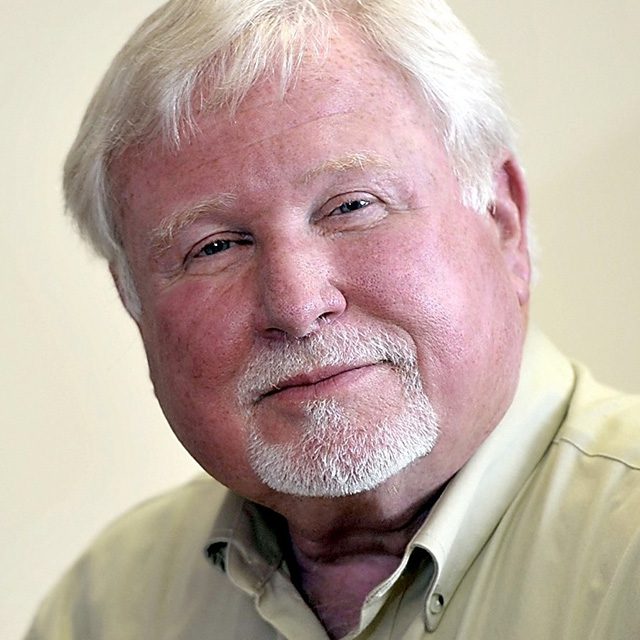Alan Baker puts his hands together like a child in prayer and raises his eyes to the heavens without saying a word. He smiles. He was just asked if he’s recently had any offers to buy his newspapers.
Baker is the owner and publisher of the Ellsworth American and Mount Desert Islander, two of a dwindling number of independent Maine newspapers. The Ellsworth American, in particular, has a national reputation for its excellence in small-town journalism. But these are times of lost readership and advertising revenue and uncertain profit.
“I’m 88, soon to be 89,” says Baker. “I pray for (an offer). Someone has to continue this.” The smile hasn’t left his face. (Aug. 9, 2018 Editor’s Note: Owner/publisher Alan Baker, 89, announced in late July that he’ll sell his award-winning papers, The Ellsworth American and Mount Desert Islander, to Camden entrepreneur Reade Brower on Sept. 1.)
“How many people who are 88, get up in the morning and say, ‘Wow. I’m not a gifted writer, I’m an adequate editor and a reasonable manager. But this is the news business and I’m playing every day.’ ”
More than 100 miles up the Maine coast from Ellsworth, Edward French interrupts a conversation to walk across the room and answer the office telephone. “Quoddy Tides …”
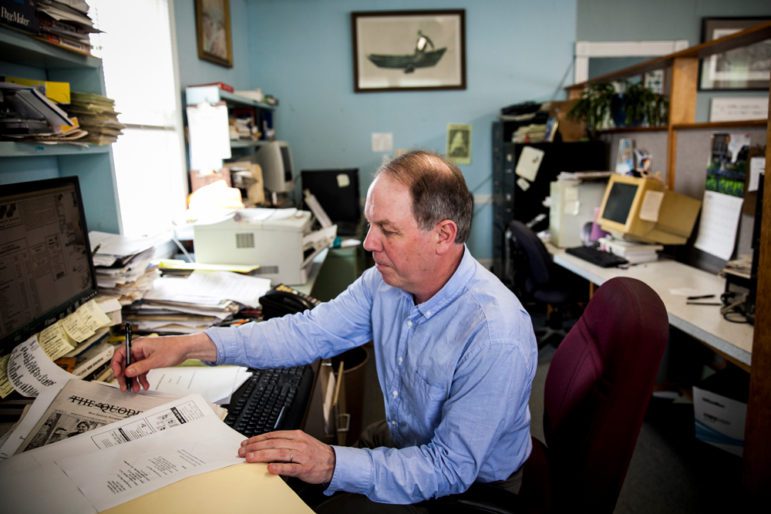
The caller wants to know the cost of placing an advertisement and a photo in Eastport’s biweekly newspaper. French quotes a price and hangs up, only to be interrupted twice more, once by a customer walking through the front door of the unremarkable wooden building next to the harbor.
“I’m sorry,” says French, returning to talk with a visitor. “I’m the only one here.”
French is the publisher of the newspaper his mother Winifred B. French started in 1968. He is the editor, a reporter, one of two people who delivers bundles of The Quoddy Tides after it’s printed on the second and fourth Fridays of each month, an ad taker and occasional receptionist. He makes story assignments, designs ads and lays out the pages. His wife, Lora Whelan, is the assistant publisher and a reporter.
Baker and French are survivors in a very stormy period for newspaper publishers. Both are determined to stand up to the economic and social challenges of today’s journalism environment.
French grew up in Eastport – his father was one of two doctors in town – and has been part of the family business for about 30 years. He left Eastport to study English at Middlebury College in Vermont and got his master’s degree in modern literature at the University of East Anglia in England.
He had other opportunities when he finished his education, but returned home to eventually write for and edit the “Most Easterly Newspaper Published in the United States.”
French is nearly 60. Has he been asked to sell The Quoddy Tides? “Not in a while. Why? Are you interested?” But in the next breath, French talked not only about being a voice of the community, but helping his isolated town find its voice.
Baker and his staffs at the American and Islander weekly newspapers are equally aware that they amplify the voices of people in the Ellsworth and Bar Harbor areas. In 2011, Baker was recognized by the National Newspaper Association with its James O. Amos Award – recognized as the highest tribute in community journalism – for his newspapers’ strong connection to community and his “vision to make life better for his employees.”
In the fall of 2017, Baker was inducted into the Maine Press Association’s Hall of Fame. The Mount Desert Islander was recognized for General Excellence in print newspapers, the Ellsworth American was runner-up in the judging of the state’s weekly newspapers. Baker started the Islander 17 years ago after seeing the Bar Harbor Times struggle with out-of-state ownership.
“We started that paper out of the box. We didn’t have a name, a staff or a design. We didn’t have advertisers.” The Islander was a newspaper in name only on Oct. 1, 2001. Six weeks later, the first issue rolled off the Ellsworth American’s presses.
“You have to have a strong ego to publish in the first place,” says Baker. “You roll out a new product every week. You have to withstand public criticism.”
Baker, with his two award-winning newspapers, and French, with his enduring family legacy, are strong threads that help hold their very different communities together. Public apathy, a big hurdle in many communities, is not a challenge in Ellsworth or Eastport.
“The culture of a newspaper and how it reflects the community,” says Baker, “is very important to its success. When I hear people we hire say ‘my family is so proud I’m working for the American,’ that means more to me than you can imagine.”
Baker and his editor, Stephen Fay, point to the tagline beneath Ellsworth American on the masthead. It reads: Real people, real places, real news. Not long ago, the tagline was “Without newspapers, there is no news.” Baker says the change was a group decision by his management team.
“We had been discussing the need to remind our audiences that the information in our newspapers was based on actual occurrences,” says Baker. “Not gossip, rumor or fiction.”
The new taglines went up on the mastheads of both newspapers on Jan. 26, 2017. No one wrote a letter, pro or con, regarding the change. But then, nothing about the newspapers’ philosophy for reporting news had changed.
“We do a mix of chicken suppers and what is happening with the town’s water supply,” says Fay. “It’s simple, accurate, local journalism with the emphasis on people’s names.”
Baker chuckles.
“We are involved in what is called ‘refrigerator journalism,’” Fay says. Where readers believe what they read is important enough to be cut out of the print edition or printed off the digital version and put for everyone in their home to see. Again and again.
Baker and Fay bring in interns every summer from some of the nation’s best journalism schools, including the University of Missouri and Columbia University. This year, Bowdoin College, Baker’s alma mater, is sending an intern. The interns bring fresh eyes and energy to the newsroom. They are writing about church suppers or Acadia National Park for the first time, not the umpteenth.
Baker’s editors teach the basics of real world journalism. “You can go to the best schools,” says Fay, “but you have to experience what it’s like to cover a real story.”
The interns move on, but years afterward, Baker still receives notes from those who are grateful for getting their start in Ellsworth or Bar Harbor. For Baker that’s another reward.
He believes in the future of local journalism and the revenue to support it. His advertising staff has a handful of people, he says, who design “spec” ads, something that was more prevalent in the last century. Display ads for print or online are tailored to the specific business. The ads are fresh, not canned.
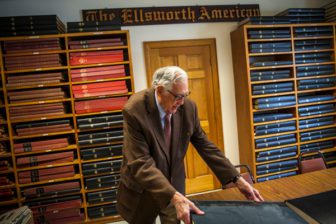 Baker calls it selling the idea. “We’ve become very aggressive in doing that.” And, by his accounting, successful.
Baker calls it selling the idea. “We’ve become very aggressive in doing that.” And, by his accounting, successful.
Baker’s roots are in advertising sales. He left Maine some 60 years ago to work for newspapers in Schenectady, N.Y., Paterson, N.J., and at The Philadelphia Inquirer. Back then, Philadelphia had five large department stores that bought 40 pages of display ads in the Sunday edition. Classified ads took up another 40 pages, says Baker. He managed a staff of five.
Baker subsequently joined Macmillan Publishers. In 1979, after 11 years with the company, his imagination and management skills led to his appointment as president of the Katharine Gibbs chain of secretarial schools. Next came a stint as president of the Berlitz Schools of Languages. Both businesses were then owned by Macmillan.
At age 50, Baker left Macmillan after becoming vice president of the company’s board of directors. He spent a year traveling the United States before returning home to Orrington. He started a company that managed marketing programs for other companies. He ran for the state Legislature and won a term in Augusta.
At the same time, he kept his eyes on The Ellsworth American, hoping to hear that J. Russell Wiggins, its legendary owner and editor, might be willing to sell. In 1986, Baker asked for a meeting. Initially, it did not go well.
As Baker tells the story, when Wiggins discovered that the purpose of the meeting was to feel him out about selling the American, he swiveled in his chair to face the wall. Undaunted, Baker started to talk about his experience. When he mentioned his role with The Philadelphia Inquirer, Wiggins, who once was a Washington Post editor, turned to face Baker and said one word: “You?” And he turned back to the wall.
Baker pitched his career with Macmillan, his time in the Maine Legislature. Wiggins would turn and repeat his first reaction. “You?”
Baker left not knowing what to expect. Soon afterward, however, he got a call from Wiggins asking to meet for lunch. Wiggins told Baker that the Concord Monitor newspaper in New Hampshire had offered to buy the American. Instead, Wiggins proposed bringing Baker on board as publisher and giving him the option of buying the newspaper once Wiggins assessed his job performance.
Baker countered by saying he would accept, but only if he was hired as general manager. Wiggins would keep the title of publisher. The counteroffer accepted, the two started giggling like schoolboys, says Baker.
The new general manager modernized the printing facility, which now prints other newspapers, including The Quoddy Tides and the three weekly papers that make up the Penobscot Bay Press – the Castine Patriot, Island Ad-Vantages and The Weekly Packet. The latter three are owned by Nat Barrows, another of Maine’s independent and longtime newspaper publishers.
Baker, who also increased advertising revenue, bought the American in 1991. In keeping with his belief that every employee is a cog in the machine, he introduced a retirement and profit-sharing plan for the more than 60 employees of the newspapers, printing facility and mailroom.
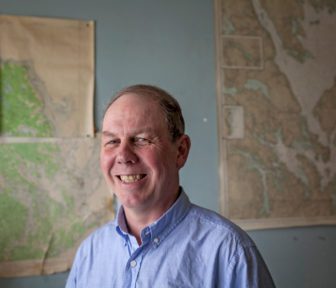
“I’m very proud,” says Baker. “We’ve got two lively, interesting, healthy newspapers.”
Farther up the Maine coast, Edward French escorts a visitor to a conference table that shares the back room of The Quoddy Tides. A large window overlooks the waterfront.
“I have to remind the people who work here to stop looking out that window,” says French with his dry humor. He has a staff of five, not counting the freelance writers and photographers he uses, and he’s already admitted he wears several hats.
Could he be talking about himself gazing out that window, which also provides a glimpse into the past, present and future of Eastport?
Eastport, the smallest of the state’s 23 cities, isn’t enjoying the population increase Ellsworth has seen since 2000. Or the addition of hundreds of new jobs that comes with the expansion of Jackson Laboratories into Ellsworth. Eastport is in Washington County, the poorest in Maine, itself one of the poorer states in the country.
French says The Quoddy Tides has lost nearly a fifth of its circulation, from 5,200 to 4,000 in the past 25 years. It’s not that 1,200 people stopped reading local news. They simply moved away to look for jobs and a better future.
“The economy here is on a roller-coaster. It always has been,” says French. The waterfront had 18 sardine canneries in the 19th century. It has none in the 21st century. Plans to harness the tides for energy have been around for just as long. The port facilities, in what is the deepest harbor in the continental United States, was once thought to be suitable for the shipping of liquefied natural gas until environmental concerns raised alarms.
Ideas surface for economic development, and sometimes there’s a mini-boon, such as when pregnant cows were hauled from Texas and shipped to Turkey through Eastport. All that remains are stories of runaway cows venturing through Eastport’s small business district and of Texas cowboys doing backflips in local pubs. When European herds recovered from mad cow disease, the need for American cows dried up, as did the dollars that flowed into Eastport’s economy.
Tourism dollars do trickle in, although Eastport is about nine miles off Route 1 for those driving north to Canada and crossing at Calais. Smaller cruise ships have made Eastport a stop on their itinerary after leaving Bar Harbor.
Everyone in this community of fewer than 1,300 people, it seems, knows the French family. Rowland French was the beloved family doctor. Winifred French, and by extension the newspaper she founded, was very active in the community. Edward French’s brother, Hugh French is director of the Tides Institute & Museum of Art. Eastport is attempting to transition to a haven for artists and creative people of all types.
French points to the resiliency of Eastport’s citizens, which is mirrored by his newspaper. “We’ve always operated lean. We survive the hard times. Eastport always needs a voice.”
He might have followed his father’s example and become a doctor. But the written word called him. He believes local journalism is vital to any community. To help increase revenue, French has expanded coverage to about 18 towns, not including villages or townships. He is paying more attention to what is happening in Calais, about 30 miles up Route 1.
The Quoddy Tides is read on Deer Island and Grand Manan in New Brunswick. There are still about 80 subscribers on Deer Island. In fact, typesetting was done there, years ago. When the ferry between Deer Island and Eastport stopped for the season, the French family turned to a fishing boat to deliver copy and ads.
Technology has eliminated such obstacles, although French kiddingly calls himself a neo-Luddite. Why, he asks, does he need to pay to upgrade his computers’ operating systems so often?
What hasn’t changed is the need to report the stories that impact the lives of the people in the communities The Quoddy Tides serves. “With a limited staff, why cover every accident or fire? We need to address local issues, so common ground can be found and we can work together. I think it’s very important that (reporters) get out of the office and talk to people who are making news or are part of the news.”
Or need to know the news. It’s all part of what French calls the symbiotic relationship between a community and its local newspaper.
Leave the business? Sell the newspaper? French shakes his head. From that big window in the back room he can see a whale come out of the ocean water. He can see across to Campobello Island. He can think of his next fishing trip into the bay.
He can think of the next story that needs to be written, the next issue to be addressed.
Baker and French, two men nearly 30 years apart in age with different personal interests and styles, different backgrounds. But at their core, they have much in common.
They are not blind to the erosion of readership throughout the country and in their backyards. French, in particular, is concerned about the generation growing up in the social media age and not appreciating the accuracy of good journalism.
“If you go by what’s on the internet or social media,” says French, “you tend to be in an echo chamber. The newspaper has an obligation to dig deeper to try to get to the truth of the matter. The role of newspapers is to support democracy.”
If newspapers continue to put a premium on fairness and accuracy, he says, “the social media generation will find their way back.”
Baker laments the consolidation of daily newspapers and the withering of reporting staffs to cut costs. Smaller, satellite communities in Maine’s more urban areas have seen coverage of their local news diminish or disappear. Baker lives in his hometown of Orrington, six miles outside Bangor. “It’s no longer covered (by the Bangor Daily News.)”
Baker. French. They are newsmen first, businessmen second. Both embrace the belief that what they do is a duty to their communities.
Baker, at 88, will look for a successor, much as James Russell Wiggins, the nationally recognized and respected former publisher of the Ellsworth American first listened to Baker’s pitch in 1986. The sale finally happened in 1991.
Baker and French are too busy to see themselves as the last of their kind. Their purpose is to publish. Real people, real places, real news. Now, more than ever.

